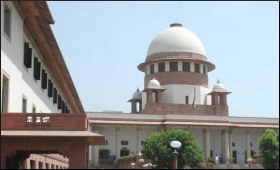|
|
|

|
'Can't fold hands and sit because it's an economic policy', SC on DeMo
|
|

|
|
| Top Stories |
 |
|
|
|
IANS | 06 Dec, 2022
The Supreme Court on Tuesday, while hearing petitions challenging the
Centres demonetisation move in 2016, said that it cannot fold its hands
and sit because it is an economic policy.
Senior
advocate Jaideep Gupta, representing the Reserve Bank of India (RBI),
submitted before a five-judge of bench justices Abdul Nazeer, B.R.
Gavai, A.S. Bopanna, V. Ramasubramanian and B.V. Nagarathna that the
objective of the demonetisation policy was to curb black money and fake
currencies, adding that not a single bank suffered losses.
Gupta
submitted that there is no challenge to the decision on constitutional
grounds, and therefore, the proportionality principle should only be
applied to the extent, which the Attorney General's note also suggested
that there should be a nexus between the objective and the method.
He
added that beyond that it will be against the run of play, as far as
economic policy decisions are concerned, and being an economic policy
measure, the court will not review the decision.
Justice
Nagarathna said the court will not go into the merits of the decision to
implement demonetisation, but it can always go into the manner it was
taken, and the two things are totally different.
"Just because
it is an economic policy, the court cannot fold its hands and sit.
Merits of the decision, it is for the government to decide in its wisdom
as it knows what is best for the people, but while taking that
decision, what was the material on record, or the relevant
considerations..." said Justice Nagarathna.
In the daylong
hearing, the RBI's counsel informed the bench that ample opportunities
were given to people to exchange their notes.
Senior advocate P.
Chidambaram, representing a petitioner, said the government should
confidently defend the decision and also the decision-making process,
adding that it should place those documents before the court.
He
said if the government was to adopt a route through the Parliament on
this count, the Parliamentarians would have stopped the policy, but it
did not follow the legislative route.
Chidambaram submitted that
the RBI Governor must be fully-aware of the fact that in 1946 and 1978,
the central bank opposed demonetisation and resorted to plenary power
of the legislature.
"Surely, the history of RBI is published by
the central bank. They must be deemed to know that also..." he said,
urging the court to see the documents to see whether the decision-making
was fair and not arbitrary.
During the hearing, the apex court
also inquired into the number of members present in the RBI's Central
Board meeting, which decided to make the recommendation regarding
demonetisation in 2016.
Gupta contended that the process under
the RBI Act to make a recommendation to the Centre was followed, and the
prescribed quorum was met.
Gupta said the RBI's Central Board
met and decided to recommend demonetisation and then it went to the
Centre, which decided to act. Therefore, the due process was followed.
Asking
RBI to submit the details regarding the quorum, the bench said, "How
many members were present? There should be no difficulty in telling us."
Gupta agreed to provide the necessary information.
Earlier, Chidambaram had alleged that the Centre and the RBI are holding back the information regarding the said meeting.
Under
the RBI Act, RBI's Central Board has to make a recommendation to the
Centre regarding demonetisation of notes or for any series of bank notes
of any denomination to cease to be legal tender.
The top court
was hearing petitions challenging the Centre's decision to demonetise
currency notes of Rs 500 and Rs 1,000 in 2016.
|
|
|
| |
|
|
|
|
|
|
|
|
|
|
|
|
|
|
| |
| Customs Exchange Rates |
| Currency |
Import |
Export |
US Dollar
|
66.20
|
64.50 |
UK Pound
|
87.50
|
84.65 |
Euro
|
78.25
|
75.65 |
| Japanese
Yen |
58.85 |
56.85 |
| As on 13 Aug, 2022 |
|
|
| Daily Poll |
 |
 |
| PM Modi's recent US visit to redefine India-US bilateral relations |
|
|
|
|
|
| Commented Stories |
 |
|
|
|
|
|
| |
|